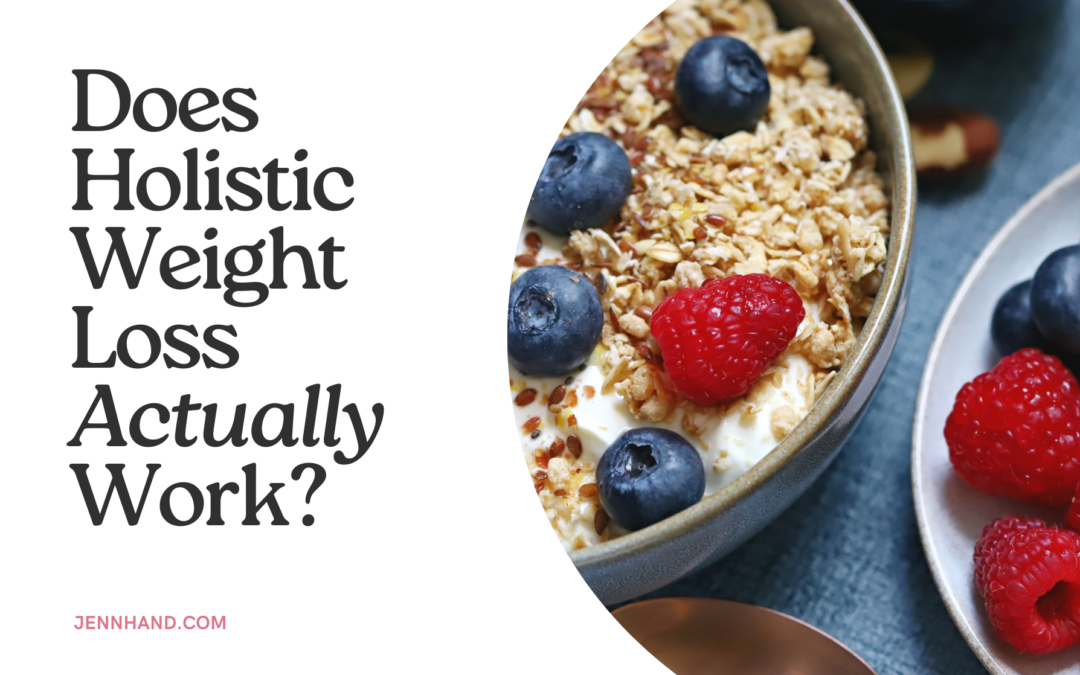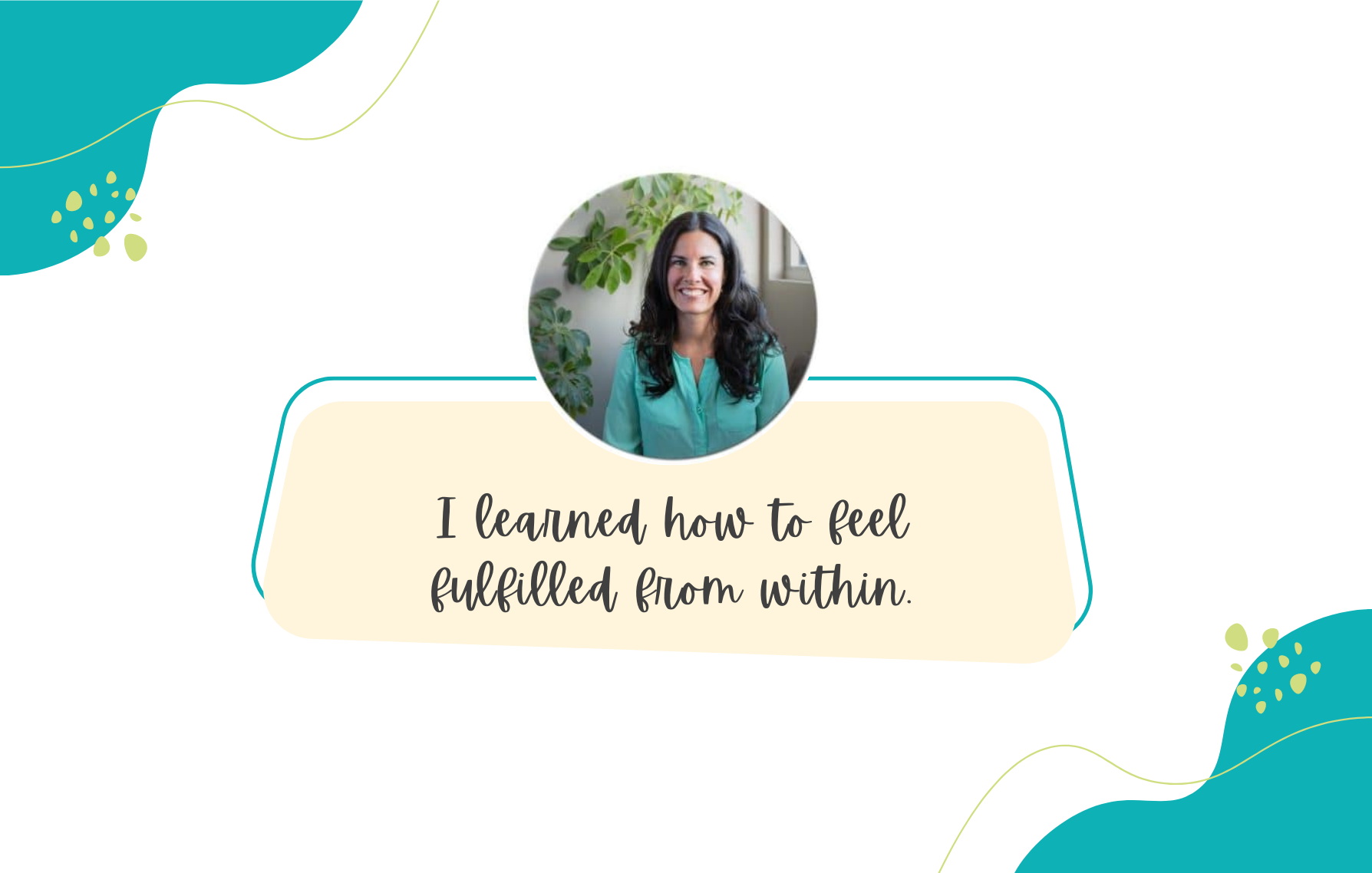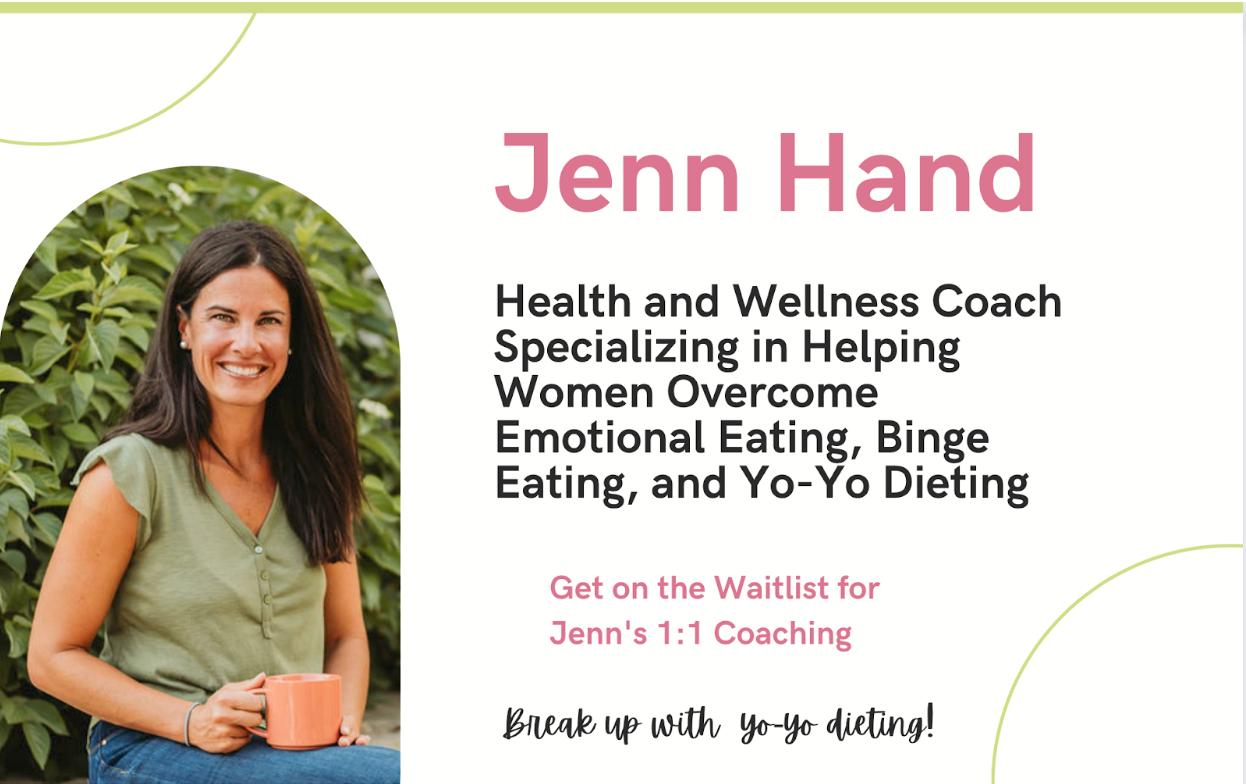Written by Jenn Hand, Holistic Nutritionist, Board Certified Health Coach, NBC-HWC
Is Holistic Weight Loss for You?
One of the reasons we end up getting stuck in the dieting cycle is because we want to lose weight.
We don’t like our body size, we desperately want to control our food, or we have to lose weight for health reasons and we do what we’ve always done– try to achieve the goal through a diet. But the paradox is that the more we try to lose weight and control our food, the more it eludes us.
Enter holistic weight loss!
Table of Contents
- What Is Holistic Weight Loss?
- A New Way to View Weight
- How Does It Work?
- The Four-Pronged Approach to Holistic Weight Loss
- How Long Does It Take?
- Is There a Holistic Weight Loss Diet Plan?
- What Is It Like to Work with a Holistic Weight Loss Coach?
- What’s It Like in Real Life?
- Next Steps
Prefer to listen to the podcast? Check it out below.
On the Podcast: Holistic Weight Loss
What Is Holistic Weight Loss?
There is a delicate balance between weight loss and food freedom.
Many of us come to think of these two things as either/or. We either go on a diet and lose the weight OR we stay stuck at our current weight but have freedom. What if there is a way to have both? I believe our bodies want to be at a weight that is comfortable for our frame. That may be different than what we THINK our size should be.
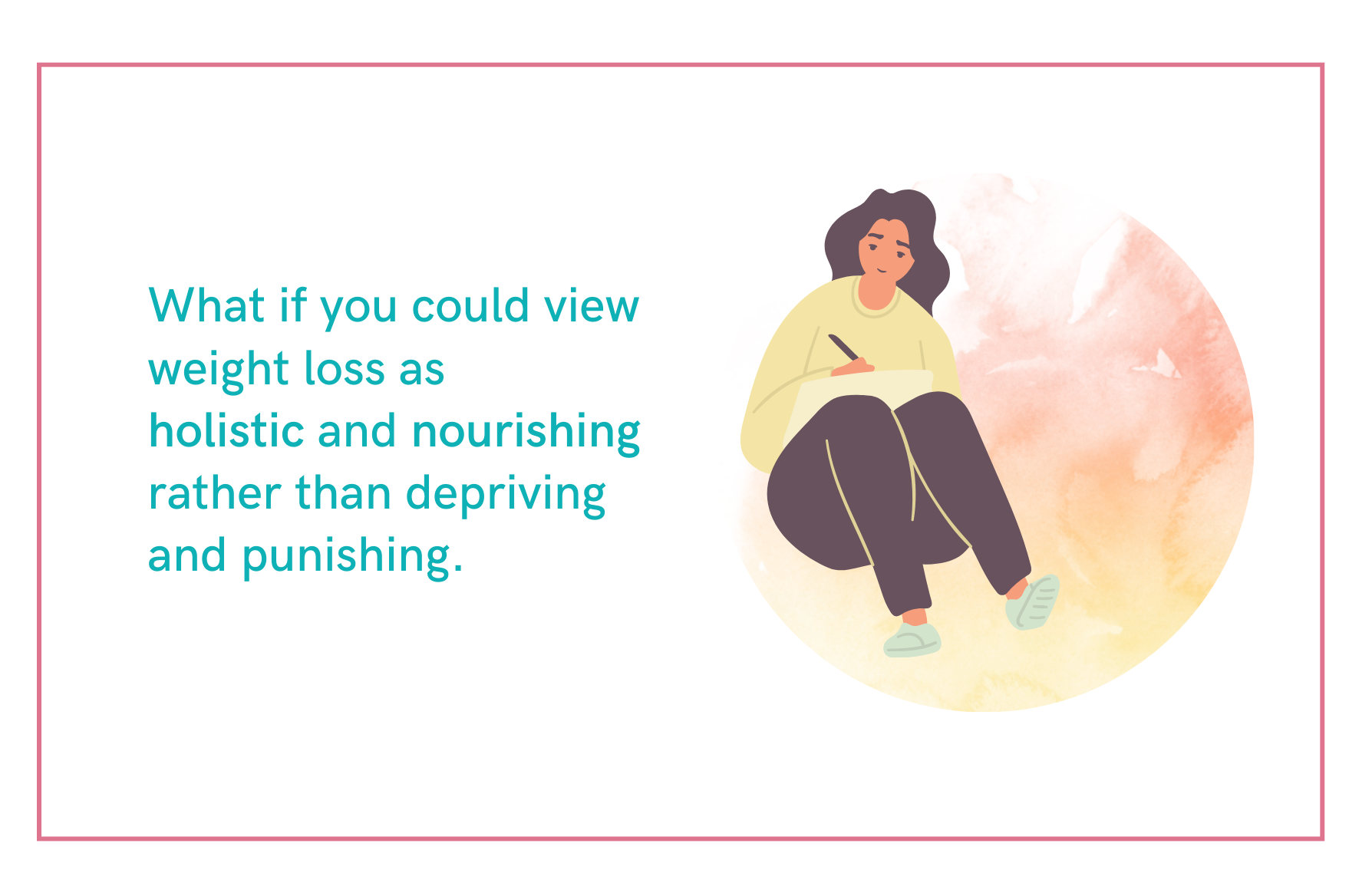
What If There Was a New Way to View Weight?
A way that was holistic and nourishing rather than depriving and punishing.
The old way of weight loss is one of deprivation, cutting out and willpower. The new way of weight loss is a holistic mind-body-soul approach that’s nourishing and compassionate. Holistic weight loss is a four-pronged approach and a completely new way of looking at weight. It’s physical, mental, emotional and spiritual.
Because we need to take into account ALL of ourselves if we want to be in alignment to restore our body’s natural state. It’s a restoration, a re-balancing, a releasing of what no longer serves you.
THAT’S the way to lasting, sustainable weight loss.
The best part? You can have both: freedom AND weight re-balancing!
🍓 Related Post: Why Your Natural Weight Isn’t What You Think It Is ->
How Does Holistic Weight Loss Work?
Not everyone is ready to approach weight from this space.
Sometimes we need to first focus on getting out of the extremes of dieting and bingeing, rather than bringing weight into the conversation. And that’s okay. I believe in honoring where we are in the journey.
After 9 years of experience in this industry, I’ve worked with all different kinds of women.
In some coaching sessions, we don’t talk much about food (we talk about emotions, boundaries, habits, stuck points, perfectionism, people-pleasing, self-care and 100 other things!) In other sessions, we talk a lot about food. It depends on where each person is, so holistic weight loss is not for everyone.
It works only when we’re ready for it.
When we’re open to having deeper conversations around the physical, mental, emotional and spiritual aspects of weight, we are open to looking at weight in a whole new way.
The Four-Pronged Approach to Holistic Weight Loss:
1. PHYSICAL: Blood Sugar Comes First
Holistic weight loss is a re-balancing of our bodies.
We work to find a healthy relationship to carbs and sugar–how much of each do we want/need? When does it feel energizing to have these foods? What would work for us in relation to our desire for freedom vs structure? A part of the physical aspect of weight is the exploration of what/how we are eating, how our choices impact our bodies, and what rhythm of eating energizes the body.
It’s important to work on figuring out how much food is “enough.”
How do you tap into hunger, fullness, and use the mind and body together to decide what way of eating works best?
Experimentation is key.
You start eating regularly and often, picking amounts you think are “enough,” and you continually get feedback from your body to refine and change/shift as you move forward.
At a retreat I did a few years ago, one of the women asked me, “How do you decide what constitutes a serving?”
I explained that at first, I guessed.
I would pick something I thought would be “enough.” I took half of the piece of chicken, 5 potato wedges and a heaping of salad on my plate. In the beginning, I still ate very much from an “eat less” perspective and learned over time to relax that diet mindset.
Then, I’d reassess throughout the meal and after I was done.
I asked myself:
- How did I feel?
- Was I wanting more?
- Did it feel like enough?
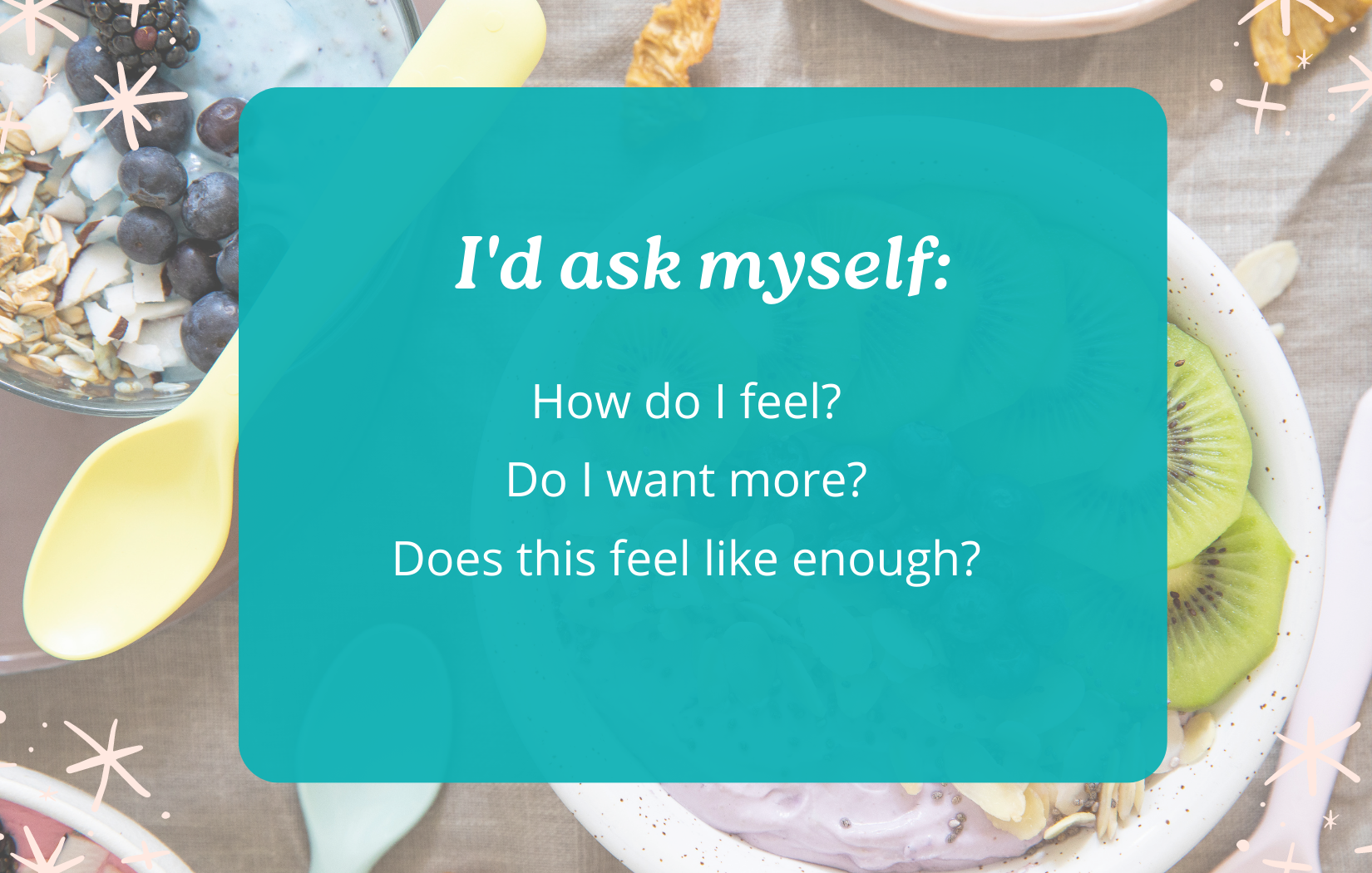
Then I’d rinse and repeat that cycle every time I ate!
If you want more foods you deem unhealthy, there can be fear around “what if I eat this way forever?” It’s a valid fear, as we can be afraid if we allow foods that aren’t “healthy,” we’ll never lose weight.
But it’s a process of using the mind AND the body to make food choices–you’re never static, and you can always change course as you learn more about what works and doesn’t.
As our blood sugar rebalances and our energy evens out, we normalize the rhythms of our bodies.
Over time, you learn to refine your food choices with awareness, experimentation and feedback!
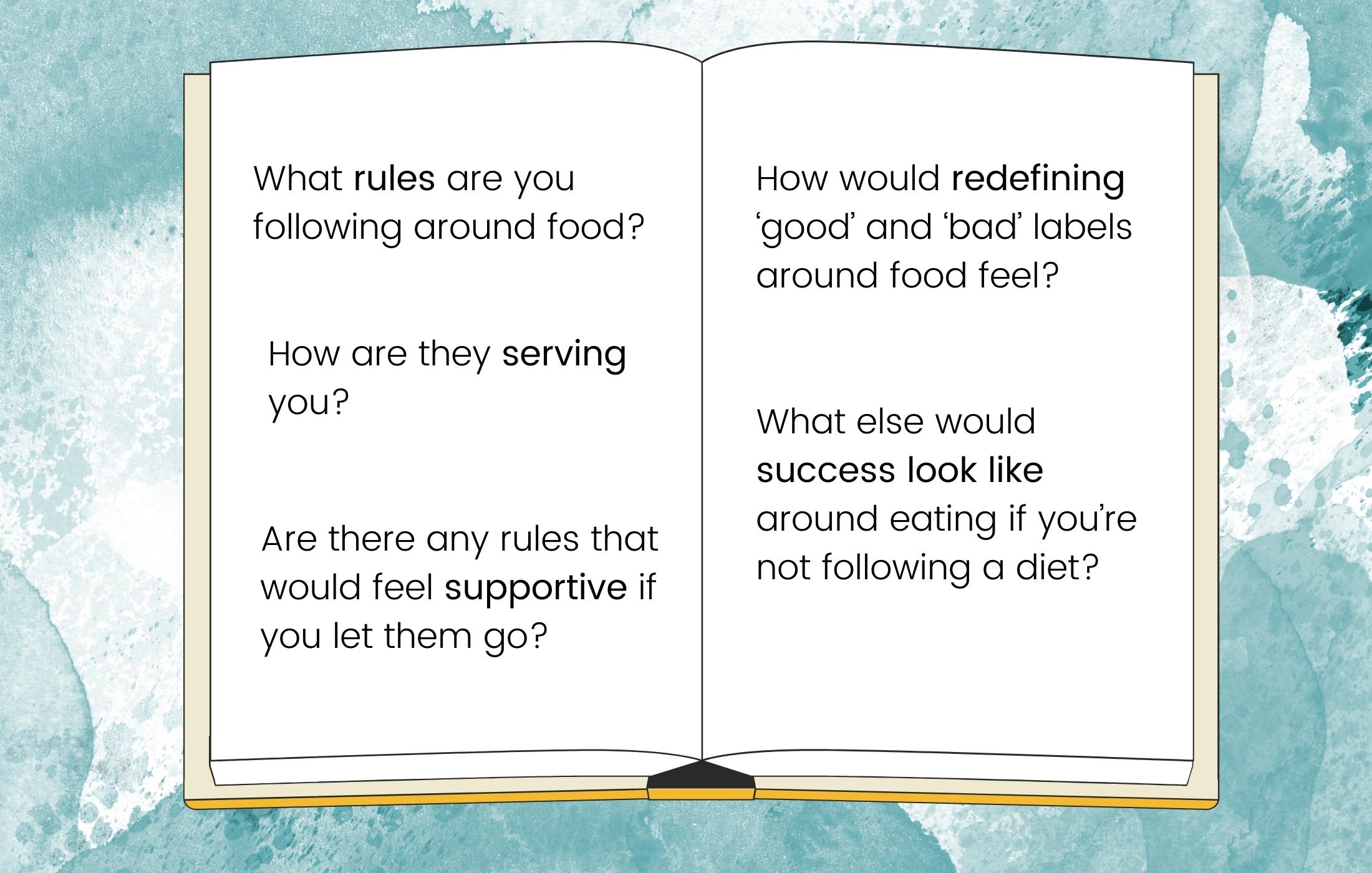
2. MENTAL: Why Mindset Is Important
A lot of what goes on between our ears doesn’t serve us.
We have a lot of rules about “good and bad” foods. From the diet world, we pick up what we “should” eat, what success looks like, and a very critical view of ourselves if we “fail”.
It’s important to pay attention to what we’re saying to ourselves.
- What rules are you following around food?
- How are they serving you?
- Are there any rules that would feel supportive if you let them go?
- How would redefining ‘good’ and ‘bad’ labels around food feel?
- What else would success look like around eating if you’re not following a diet?
These questions can help you explore and work through the mental tapes you have to let go of in order to find a balanced relationship with food.
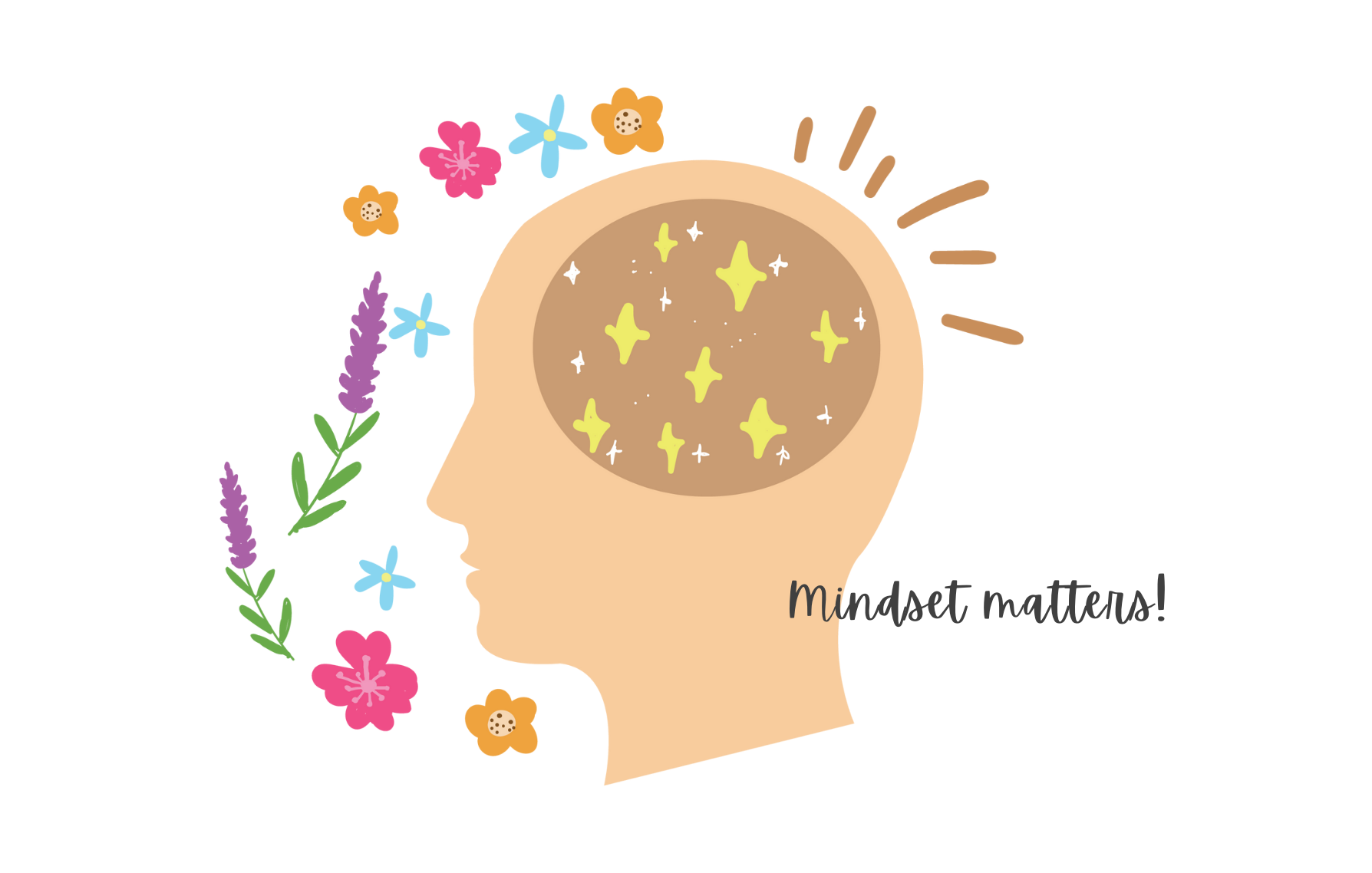
It can also help to reframe weight loss to weight restoration or weight rebalancing.
Even still, for me, the term “weight loss” conjures up willpower, deprivation, cutting things out and a lot of effort.
But if we ask questions like these instead…
- What would best support my body in moving back into a place of balance?
- How would it feel to allow my weight to normalize?
- What does it look like to nourish my body toward a natural weight?
…we can shift it from deprivation to one of support and nourishment as we help our body move back into its optimal size.
Our mindset is important in the rebalancing process, as being aware of our critical thoughts and rules can help bring awareness to them so they can change.
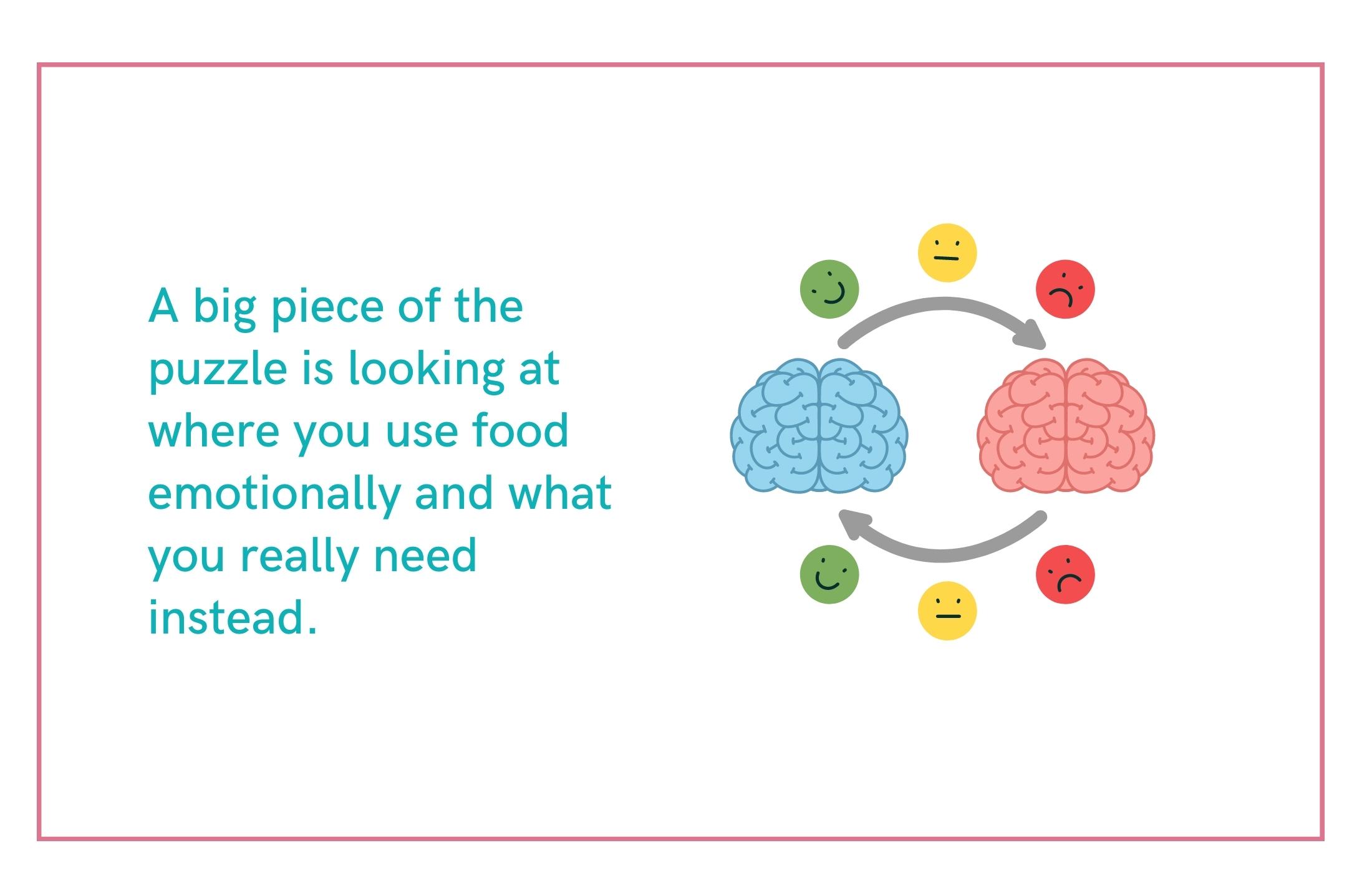
3. EMOTIONS: A Big Piece of the Weight Puzzle Lies with Our Feelings
Emotions are tied very closely to our relationship with food.
Studies show that over 75% of overeating is caused by our emotions. For those of us who’ve battled food, we learn to use food as a coping mechanism. We learn to eat when we’re happy, sad, lonely, stressed, anxious, afraid and everything in between. We eat to soothe pain, to escape the realities of life, to ease the heavy load that as humans, we sometimes carry.
A big piece of the puzzle is looking at where you use food emotionally and what you really need instead.
Balancing emotional healing with wanting to lose weight is a dance–we learn to hold the two desires of freedom and weight restoration simultaneously.
Exploring the world of emotions via journaling, tapping, breathwork, expression and letting go is a huge piece of the weight restoration equation.
I often reflected in my journal on questions like these:
- What person or feeling sent me to the food?
- What do I not want to feel?
- Am I afraid of this emotion? How can I move through that fear?
- What am I hoping this food will do for me?
- What is it that I really want instead?
These types of questions can prompt you to look at addressing the emotion rather than eating over it.
As you continue to learn to feel and express and let go of the food as an emotional support, it releases your body (and yourself!) to cope with life rather than turning to food.
This is huge in weight rebalancing because, typically, on diets, we never address WHY we are eating.
4. SPIRIT: The Spiritual Perspective Is a Unique One
It’s rare that spirituality is talked about in the world of weight loss.
To me, it’s the piece of the puzzle that’s often missing, as so much is tied into the spiritual aspect. Our identities can get wrapped up in our “food/weight struggle” as a part of who we are.
- Who would we be without this issue?
- What would we do with our time if we weren’t spending energy on this?
- What would I talk about with people?
This was a big one for me.
I identified so strongly with my food issues that I was afraid of not having them. Even though they didn’t serve me, they felt familiar and safe.
Subconsciously we might hold on to our excess weight because it’s “safe.”
No one notices us, and we can hide more easily. We may be afraid of sexual attention. There are all kinds of fears are wrapped up in holding on to our weight.
Weight can be a protector and a safety barrier. It can also be a pointer to the spiritual aspect! How do we fill the emptiness inside rather than try to use food?
I had a deep emptiness inside of me that I filled with food.
Once I was aware of this, I worked to learn how to fill that void: how to find peace and contentment and how to feel fulfilled from within.
This part of the puzzle is usually the most transformational, as it’s where lasting healing happens on a deep level.
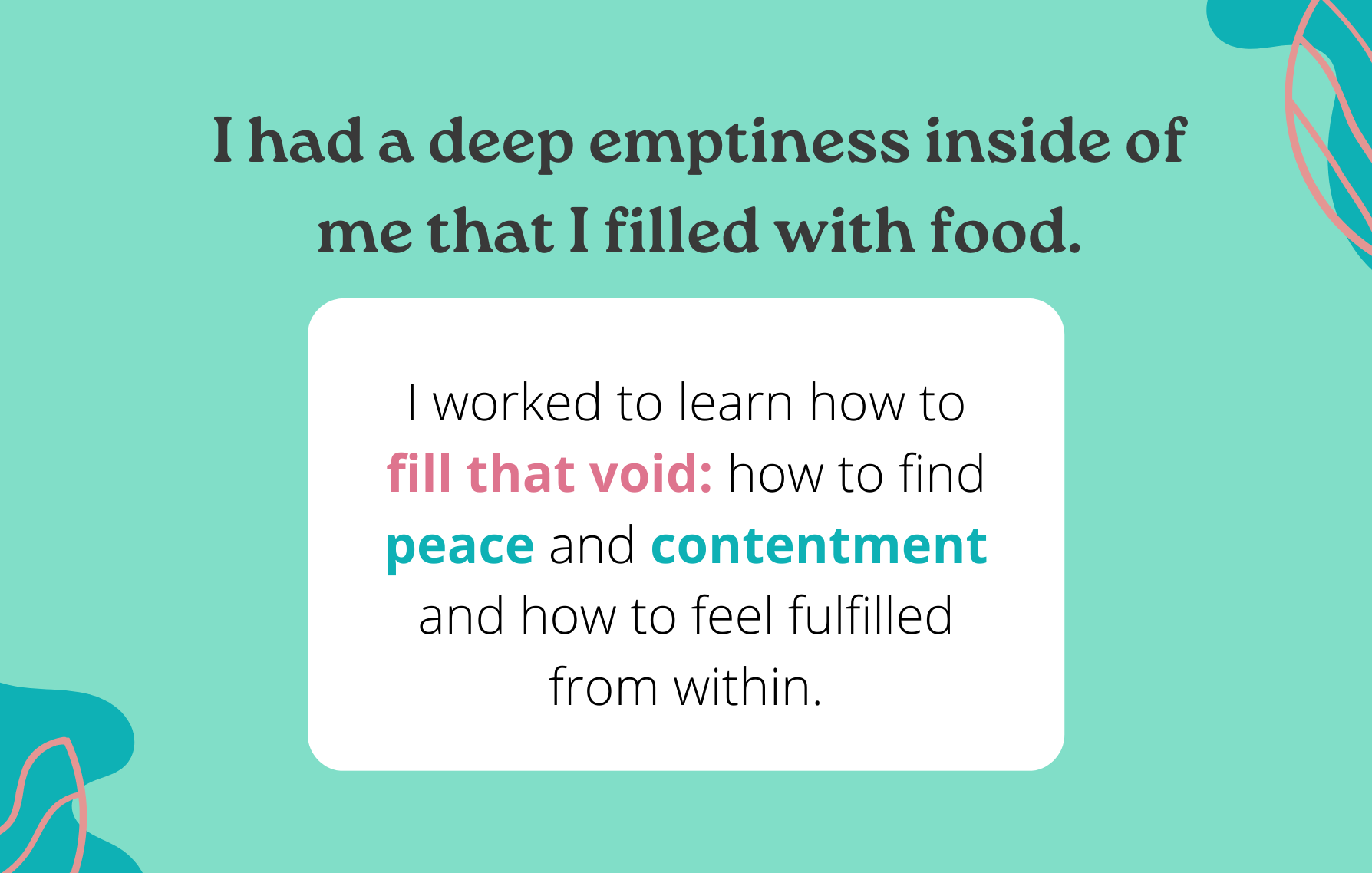
How Long Does Holistic Weight Loss Take?
My favorite question that I used to ask the woman I worked with whenever she suggested anything:
“Well, how long will it take?”
I wanted to know EXACTLY how long it would take to lose weight, to stop bingeing, not to eat emotionally, to like my body.
But there isn’t a simple answer to this question.
For some people, they see changes in a few months. Other people take years. It depends on where you are in your journey. For some people, it makes sense to focus on the “finding freedom” piece of the puzzle. Other people feel more ready to explore weight as a topic very early on.
If you’re early on in this, it may make sense to explore holistic weight loss down the road.
If you’ve been on this path for a while, you may resonate with it more and be ready.
Is There A Holistic “Diet Plan” for Weight Loss?
Do you even use a diet plan for holistic weight loss?
If you’ve read any of my blogs or listened to the podcast, you know I never prescribe a specific way of eating. 🙂 This is the “old way” of thinking about weight! The new way is to learn what your body needs, how much and when. I typically recommend eating every 3-4 hours as a start.
Some women would rather do 3 meals a day, which is great, too.
From there, you can change as you get feedback on what most energizes your body, what helps you feel most balanced, and how much structure or permission you need.
There is no diet plan.
The “plan” is to start at Point A. You’re usually eating every 3-4 hours or another starting point that works for you. Then refine from there, bit by bit, as you learn what works and doesn’t.
I also usually recommend adding protein every time you eat.
This helps to digest your food more slowly and keeps you satiated.
What Does It Look Like to Work with a Holistic Weight Loss Coach?
I’ve been asked this question many times over the years:
Will I lose weight working with you?
It’s always a loaded question, as there are so many things that go into releasing weight.
Among the things that can affect weight loss are the following:
- stress
- hormones
- life situations
- relationship to food/exercise
- metabolism
- genetics
- mindset
- seasons
- and more!
What Is Your Sustainable Weight?
Your sustainable weight is the weight at which your body feels balanced and healthy, achievable through consistent, healthy habits without extreme dieting or over-exercising.
It’s a weight that fits your frame, naturally and effortlessly. It’s one where you can maintain comfortably while enjoying nutritious foods, regular physical activity, and a balanced lifestyle, where you have a positive relationship with food and your body.
Promises Are a Red Flag
I always say if someone DOES promise weight loss, that may be a red flag, as no one can 100% guarantee that!
My approach is four-pronged, so we work on ALL aspects that impact weight. I use the physical, mental, emotional, and spiritual pillars to guide me. We start by looking at your food and examining what and how you’re eating.
This is done from a curious, compassionate perspective, not the old critical diet space.
It’s a Softer, Gentler Approach
From the physical, we move into the three deeper prongs of mindset, emotions and spirituality.
It depends on where you struggle and what is keeping you stuck. Some people get mired down in “good and bad” and we work on that. Others have health issues and need to lose weight but don’t want to diet.
We may also talk about limiting beliefs, self-sabotage, how to approach sugar and carbs, learning to trust your body and everything in between!
It’s Not Just About Mindful Eating
While mindful eating is a crucial component of holistic weight loss, it’s not the only factor.
Achieving lasting weight loss also involves addressing emotional health, looking at underlying factors that may impact weight (self-sabotage, limiting beliefs, food rules, etc), managing stress, engaging in regular physical activity, and ensuring adequate sleep.
A comprehensive approach that integrates these elements fosters a healthier lifestyle and more effective, lasting results.
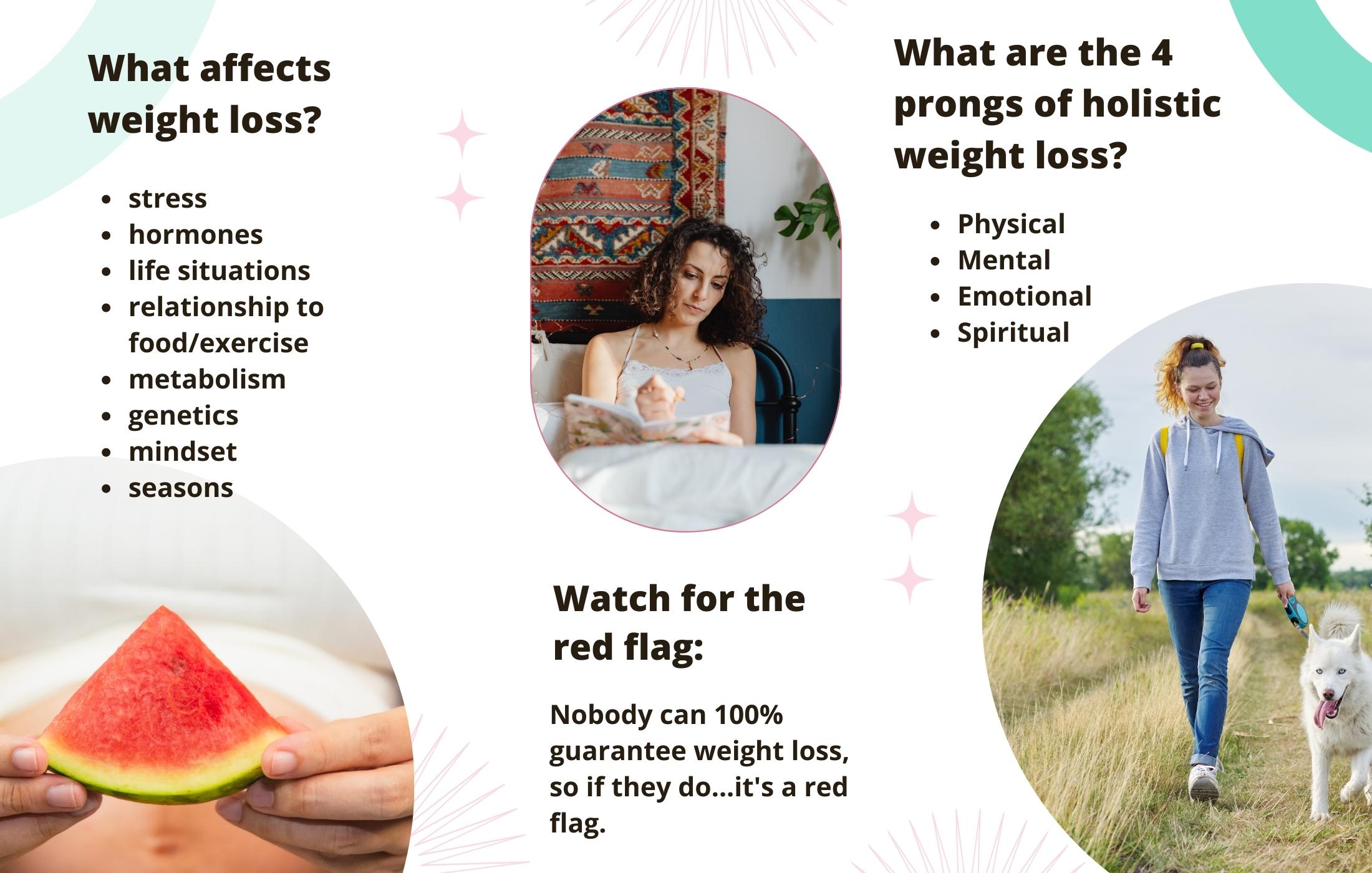
What Does It Look Like in Real Life?
I don’t work with everyone on this exact topic.
Much of my work is helping women out of the diet/overeat cycle and breaking free from emotional eating. But one of my favorite stories is about a woman named Lori, who I worked with for about a year.
We first began work on getting out of the diet/binge cycle.
Her main struggles were:
- Too many rules — she wasn’t satisfied with what she ate because she had so many “bad” foods
- Black or white thinking — if she ate anything bad, she would say ‘screw it’
- Lack of belief that she could ever lose weight without dieting
- Struggle with gaining 30 pounds during covid
- Wanting to lose weight but knowing she couldn’t follow a diet
We began working initially on allowing more foods while still feeling like she was eating “healthy.”
We did a lot of exploration around mindset and breaking beliefs she had about what she “should” be eating — even when she wasn’t satisfied with only the “healthy” foods.
All throughout the process, she was very skeptical of ever losing weight.
She originally just wanted to stop dieting and find her “normal.”
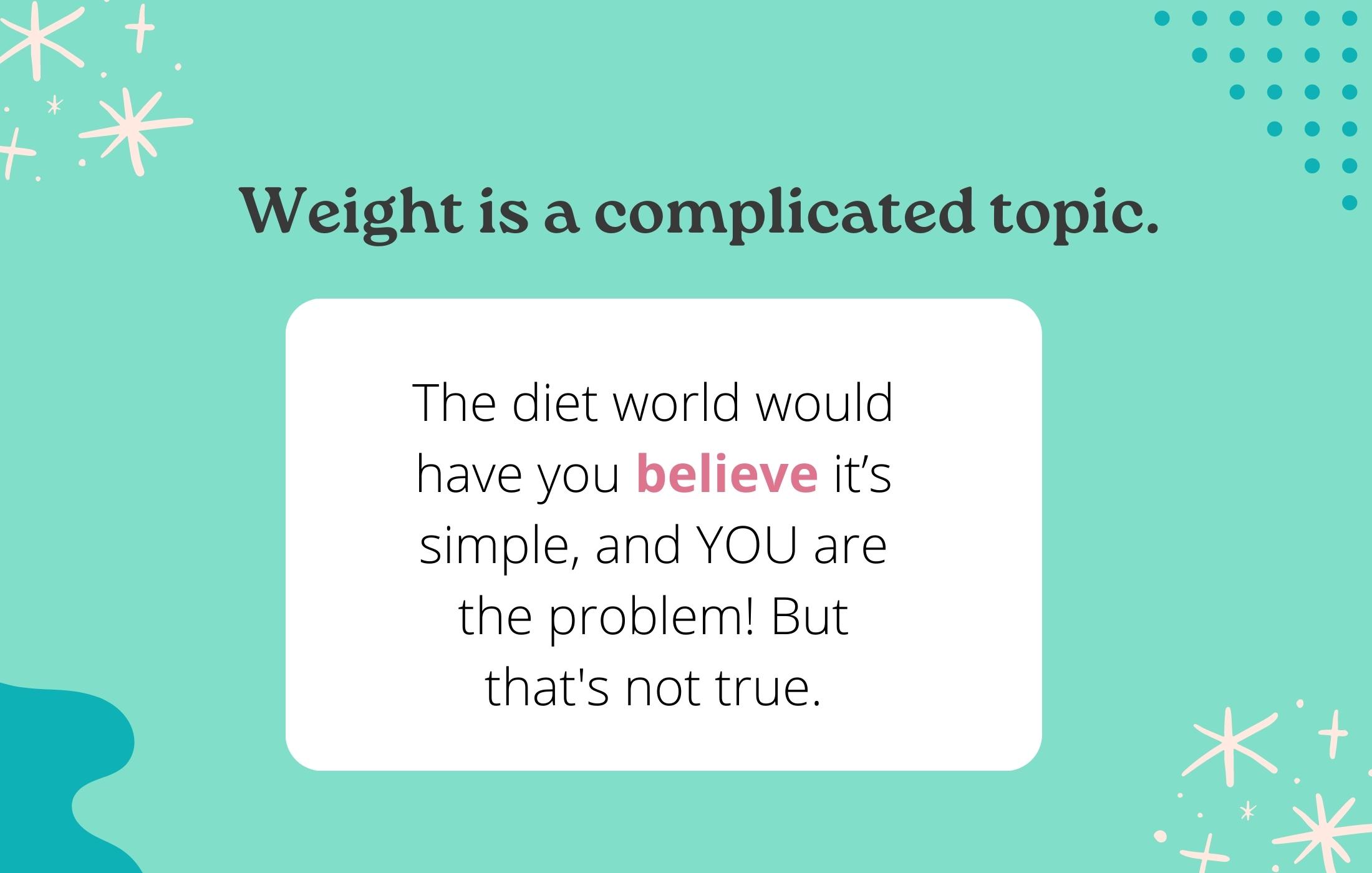
But then, over time, she realized that deep down, she didn’t feel comfortable in her body.
It wasn’t a mindset thing. It was discomfort from gaining a lot of weight during Covid. She didn’t feel like herself in her body. She longed for the days when she could easily move around without pain and discomfort. As we worked together, her food choices began to shift and even out.
She began wanting foods that were “healthy.”
But one issue she had was that as she started to release weight, someone would comment, and she’d freak out and gain it back. This is the emotional/spiritual part I mentioned! before. She had a fear of getting attention if she released weight.
We untangled these fears and the beliefs that were keeping her stuck.
As we began making serious progress, we looked deeply at her relationship with sugar. She wanted to explore a healthier way to have sugar.
So she experimented with allowing AND limiting sugar—how about that for a paradox!
She felt like sugar impacted her body in a way that she didn’t like, so she wanted to eat mostly foods that didn’t contain sugar without making this a rule. It was a dance of structure and permission.
Over time, she did begin to lose weight.
We worked on the stumbling blocks that came up along the way:
- She got sick
- She lost her appetite
- She got that gleeful “yes, you’re not eating a lot, and you’ll lose more weight!” voice stuck in her head
- She had a fear her body wouldn’t reset back to her comfortable weight
- Trusting herself long-term was still a big fear
- She was afraid that somehow she would lose weight but not stay that way
- Body image issues of “it’s never enough”
- The more weight she lost, the more she kept wanting to lose
Weight is a complicated topic.
The diet world will have you believe it’s simple, and YOU are the problem!
At the end of our work, she not only lost weight but felt she had the tools to cope with emotions, trust herself around food and understand on a deeper level how weight is a reflection of so many other things!
Common Questions About Holistic Weight Loss
What are the main reasons for weight gain?
Weight gain is complex. It can be caused by a combination of factors including what and how we eat, living a sedentary lifestyle, stress, hormonal imbalances, and inadequate sleep.
Do I need to work with an integrative medicine practitioner if I want to lose weight holistically ?
While it’s not necessary, working with an integrative medicine practitioner can provide a comprehensive approach to weight loss by addressing underlying health issues and promoting overall wellness.
What role does emotional health or mental health play in achieving a healthy weight holistically?
Emotional and mental health are crucial in holistic weight loss, as they influence eating habits, motivation, and the ability to manage stress, all of which impact weight management.
Can physical activity alone lead to significant weight reduction, or are other holistic approaches necessary?
Physical activity is important but combining it with other holistic approaches such as mindful eating, stress management, and proper nutrition is essential for sustainable weight loss.
How does mindful eating support sustainable weight-loss goals?
Mindful eating helps you listen to your body’s hunger and fullness cues, reduces overeating, and promotes a healthier relationship with food, supporting long-term weight loss.
Do you recommend taking any nutritional supplements?
Nutritional supplements may be beneficial for some individuals, but it’s important to consult with a healthcare provider to determine what’s appropriate for your specific needs.
How does maintaining a healthy weight contribute to overall well-being?
Maintaining a healthy weight can improve energy levels, reduce the risk of chronic diseases, enhance mood, and promote overall physical and mental well-being.
What are the different holistic approaches to weight loss?
Holistic weight loss approaches include mindful eating, regular physical activity, stress management, adequate sleep, balanced nutrition, and addressing emotional and mental health.
More Articles About Holistic Weight Loss and Intuitive Eating
⚪ How to Get Off the Diet Roller Coaster
⚪ Yo-Yo Dieting and Why It Doesn’t Work
⚪ 7 Myths of Weight Loss
⚪ If You’re Not Dieting, How Will You Lose Weight?
Get the Normal Eater’s Newsletter
Join 8000+ women who are overcoming overeating, binge eating, and breaking up with dieting forever. Get Jenn’s inspiring and actionable weekly newsletter with the latest posts, podcasts, and tips on how to love your body, find food freedom, and lose weight holistically.
Get the Normal Eater’s Newsletter
Work with an Emotional Eating & Holistic Nutrition Coach
Overcome Bingeing and Emotional Eating, and Break Up with Yo-yo Dieting
Working with an emotional eating coach and holistic nutritionist can help you get free from the frustrating binge and restrict cycle and stop yo-yo dieting.
You don’t have to be obsessed with food or have a million rules around eating to find your natural weight and learn to love your body. Ready to actually see a lasting change and experience true freedom?
Click here to schedule a 20-minute introductory coaching call.
About the Author:
Jenn Hand has been helping women like you become normal eaters since 2015.
She’s worked with thousands of women, helping them to balance their bodies, end bingeing, stop obsessing over food, and start feeling amazing again. As a board-certified health coach and holistic nutritionist, Jenn knows how to support you in making real positive changes that last.
Her articles have been published on Mind Body Green, Tiny Buddha, Thrive Global and other local and global media platforms. She’s the author of How to Be a Normal Eater and the creator of The Normal Eater’s Club program. Listen to Jenn’s advice and tips on the Cake Doesn’t Count Podcast, or read more of her articles for free on the Food Freedom Blog.
Learn more about private coaching with Jenn here >

